Find fascinating insights into the intricate dynamics of blended families in biblical times, revealing timeless lessons for modern households.
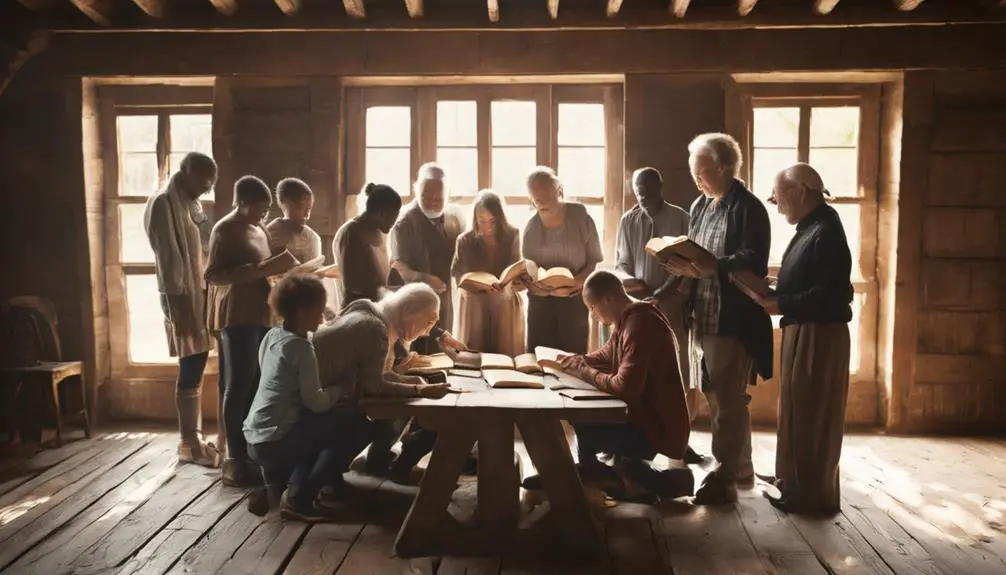
Blended Families in the Bible
Peeling back the layers of biblical narratives, you'll find the concept of blended families woven into the fabric of many stories. From Abraham's diverse family tree to the complex households of Jacob and King David, it's clear that the Bible doesn't shy away from the intricacies of familial bonds.
But have you ever thought about the lessons these blended families offer, and how they might resonate with modern day blended families? Hang on tight, as we're about to navigate the labyrinth of blended families in biblical times.
Key Takeaways
- Biblical blended families showcase complex dynamics influenced by faith, power, and survival.
- Sibling rivalry and favoritism often escalate tensions within these families.
- Forgiveness and reconciliation emerge as crucial themes in maintaining unity in biblical blended families.
- Women in blended families play significant roles despite facing unique cultural and hierarchical challenges.
Abraham's Diverse Family Tree
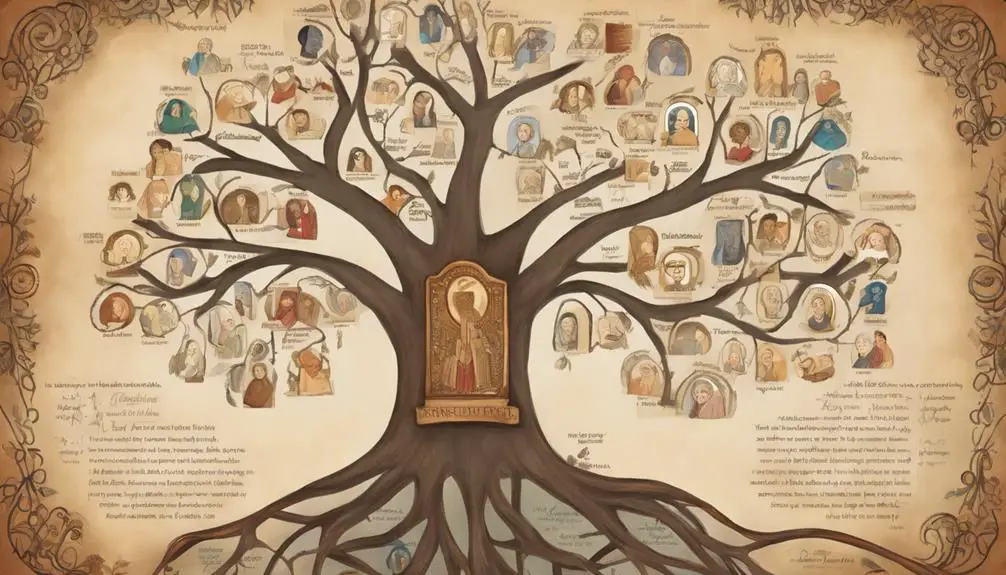
Diving into Abraham's diverse family tree, you'll uncover a rich tapestry of blended family dynamics that offer profound insights into the complexities of familial relationships in biblical times. A key figure in this dynamic is Abraham's wife, Sarah. Her influence is pivotal as she navigates the cultural expectations and personal desires that shape her family.
Sarah's influence, though marked by impatience and human frailty, is one of faith and resilience. Her decision to offer her maidservant, Hagar, to Abraham as a surrogate was steeped in the societal norms of the time, but it also highlights the desperation and faith of a woman yearning for a child.
On the other hand, Hagar's struggles are a testament to the trials faced by women of lower status in biblical times. Used as a pawn in Sarah's plan, Hagar suffers greatly, bearing the brunt of Sarah's frustrations. Yet, her story is one of survival and divine intervention, underlining the merciful nature of God amidst human complexities.
In examining these narratives, you'll gain a deeper understanding of the intricate fabric of Abraham's family and the nuanced dynamics of faith, power, and survival that underpin it.
Jacob's Complex Household
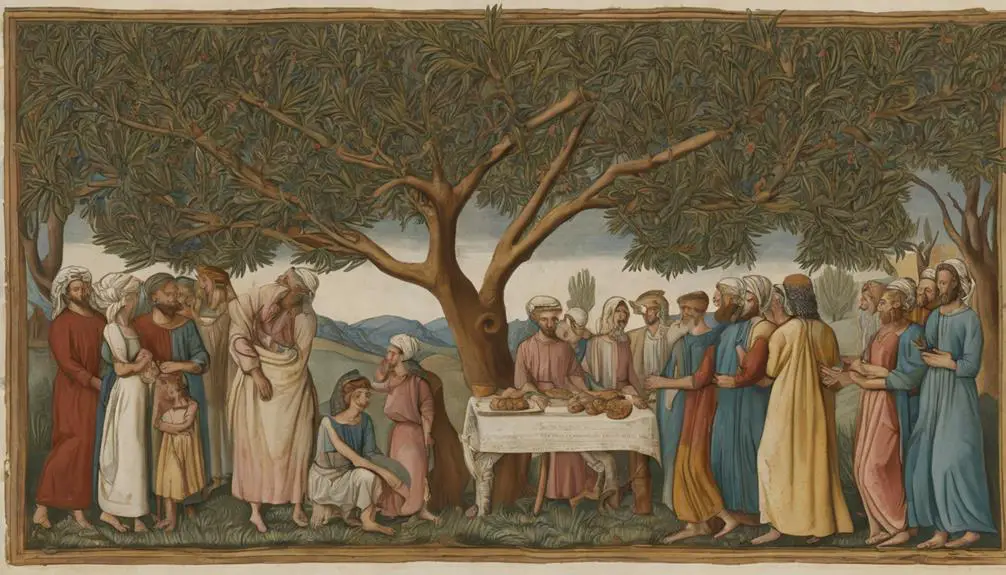
Shifting our focus to Jacob, another pivotal figure, we find an even more complex web of familial ties and dynamics in his household. Jacob's Polygamy is a key aspect that shaped his family structure and dynamics. This practice, seen as a social norm at the time, allowed him to father twelve sons and a daughter from four different women.
The rivalry between Rachel and Leah, his first two wives, was another critical influence on the family dynamics. This rivalry stemmed from the disparity in Jacob's love for them. Leah, though less loved, was more fertile, creating a complex web of relationships within the family.
Consider this table that outlines Jacob's wives and their children:
Wife |
Sons |
Daughter |
|---|---|---|
Leah |
6 |
1 |
Rachel |
2 |
0 |
Bilhah |
2 |
0 |
Zilpah |
2 |
0 |
From this analysis, it's clear that the complex family structure and dynamics in Jacob's household were largely influenced by his polygamous practices and the Rachel-Leah rivalry. These factors significantly shaped the lives of their children, contributing to the rich tapestry of Biblical family narratives.
The Story of Joseph and His Brothers
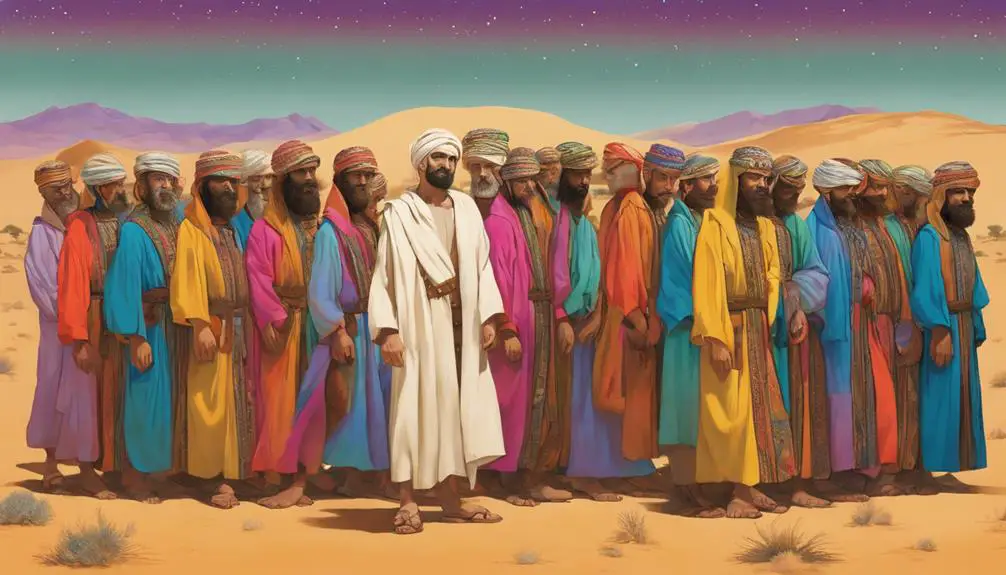
Building upon the intricate family dynamics established in Jacob's household, you'll find the story of Joseph and his brothers presents a compelling exploration of sibling rivalry, favoritism, and forgiveness. This narrative unfolds with Joseph as the favored son, inciting jealousy and animosity among his brothers.
- Joseph's Integrity: Despite the adversity he faces, Joseph maintains his integrity. You'll notice his refusal to compromise his principles, even when falsely accused and imprisoned. His steadfastness is rewarded, elevating him to a position of power in Egypt.
- Sibling Rivalry: The brothers' animosity towards Joseph stems from their father's favoritism. It escalates to the point where they sell Joseph into slavery, hoping to rid themselves of him permanently.
- Brotherly Reconciliation: The crux of this story lies in the eventual reconciliation. After a series of trials, Joseph's brothers seek his help, unaware of his identity. Joseph, instead of seeking revenge, forgives and aids his brothers, embodying the virtue of forgiveness.
King David's Intricate Family
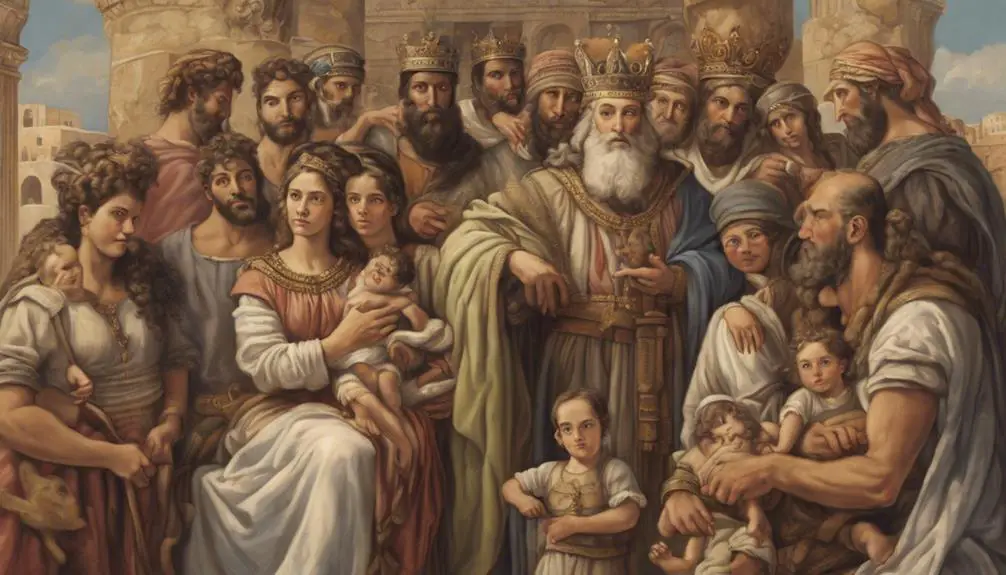
In the tapestry of Biblical blended families, King David's complex familial relationships provide a dramatic study of power dynamics, scandal, and redemption. You see, King David had multiple wives which led to a blended family structure that was delicate and politically charged. His wives included Ahinoam, Abigail, Maacah, Haggith, Abital, and Eglah. Yet, it was his relationship with Bathsheba, originally the wife of Uriah, that led to the birth of Solomon.
David's wives and their respective children provide a study in power dynamics within blended families. Consider the following:
Wife |
Notable Child |
|---|---|
Ahinoam |
Amnon |
Abigail |
Daniel |
Maacah |
Absalom |
Haggith |
Adonijah |
Bathsheba |
Solomon |
Each of these sons had their own story, with Solomon's birth and eventual ascension to the throne being the most well-known. The interplay, intrigue, and even violence that arose from these familial connections underscore the complexities of navigating blended families, particularly in positions of power. Undeniably, King David's intricate family serves as a fascinating biblical case study.
The Prodigal Son: A Blended Perspective

As we delve into the parable of the Prodigal Son, it's crucial to consider the nuances of blended families and their potential influence on this timeless narrative. This parable offers rich insights into the dynamics of father-son relationships, especially against the backdrop of family complexity.
- Prodigal's Remorse: You notice the son's deep regret and desire for reconciliation. This remorse, often seen in blended families, reflects an inner struggle to reestablish familial bonds that were once broken.
- Father's Forgiveness: The father's immediate and unconditional forgiveness is indicative of the yearning for unity within the family unit, typical in blended families. His forgiveness, irrespective of the son's past actions, demonstrates the power of love and acceptance.
- Brother's Resentment: The elder brother's resentment towards the prodigal son's return echoes the feelings of displacement and rivalry often experienced by siblings in a blended family.
In analyzing these elements, you might reconsider the parable of the Prodigal Son from a modern perspective, seeing it as a representation of complexities and challenges faced by blended families. It's a testament to the enduring power of love, forgiveness, and the quest for unity amidst diversity.
Frequently Asked Questions
How Did Blended Families Impact the Spiritual Lives of Key Biblical Figures?
In studying key figures, you'll note how blended family dynamics greatly influenced their spiritual journeys.
Divine intervention often played a crucial role in these interactions, impacting individual faith and guiding decisions.
Much can be learned from analyzing these complex patriarch dynamics, which often served as catalysts for significant spiritual growth and development.
The unique challenges faced by these figures can offer valuable insights into the multifaceted nature of faith.
How Did the Societal Norms of That Time Influence the Dynamics of Blended Families in the Bible?
You're examining how societal norms, specifically marital norms, influenced dynamics within families. Consider biblical times, where polygamy was common. This undoubtedly impacted family structures and interactions.
Polygamy's impact led to complex relationships, power dynamics, and conflicts within these households. It's clear societal norms heavily shaped these domestic scenarios, often complicating familial bonds and responsibilities.
Thus, societal norms played a significant role in shaping family dynamics.
What Were the Typical Roles and Responsibilities of Step-Parents and Step-Siblings in Biblical Times?
In biblical times, step parenting duties typically involved providing for the family, guiding the children, and maintaining order.
You'd also find sibling rivalries, often fueled by inheritance disputes and favoritism.
However, their roles weren't rigidly defined as they're now.
You'd need to understand that societal norms then influenced these dynamics significantly, resulting in a complex web of relationships and responsibilities within these families.
Are There Any Explicit Teachings or Commandments in the Bible Addressing the Challenges Faced by Blended Families?
You're asking if the Bible presents explicit teachings or commandments addressing challenges faced by blended families.
While it doesn't specifically address this modern term, it does discuss divorce, remarriage, and adoption.
For instance, in the context of divorce and remarriage, the Bible offers guidance in books like Matthew and Corinthians. Similarly, adoption practices are mentioned in the book of Exodus.
The interpretation of these passages, however, often depends on one's personal beliefs and values.
How Can Lessons From Biblical Blended Families Be Applied to Modern-Day Blended Families for Healthier Relationships?
You can apply lessons from Biblical blended families to modern ones by adopting a compassionate view towards divorce and embracing Biblical adoption principles. This encourages acceptance and love, fostering healthier relationships.
Understand that every family member's feelings are valid, just as in Biblical times. By integrating these lessons, you're not just blending families, but also cultivating respect and unity.
Conclusion
So, you see, blended families aren't a modern phenomenon. They've been around since biblical times, as seen in the households of Abraham, Jacob, and King David.
Even the parable of the Prodigal Son suggests a blended perspective. Despite the challenges, these families navigated complex relationships and dynamics, showing that unity and harmony can exist within diversity.
Perhaps, there's a lesson in these ancient tales for our modern blended families.

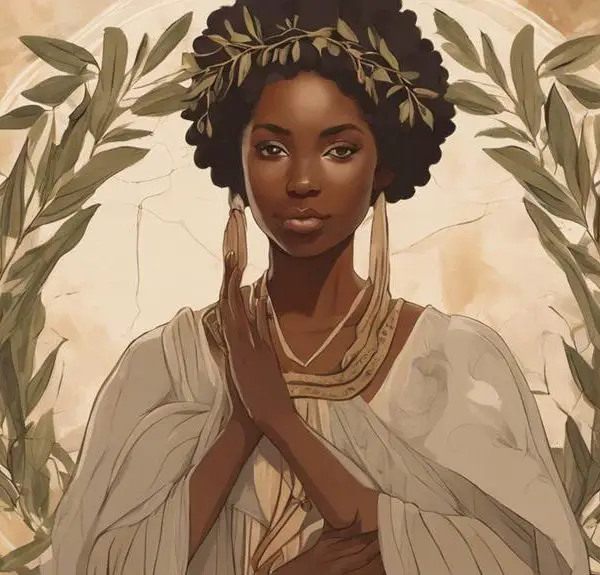

Sign up